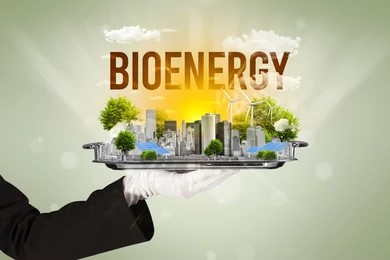In recent years, the global focus on renewable energy sources has grown significantly. One of the key contenders in this field is bioenergy, which harnesses the power of nature's biomass to generate clean and reliable power.
By utilizing organic materials such as plants, wood, agricultural waste, and even algae, bioenergy offers a sustainable alternative to traditional fossil fuels. In this article, we will explore the concept of bioenergy, its benefits, and its potential for shaping a greener future.
The Power of Biomass
Biomass refers to organic matter derived from plants and animals. It includes agricultural residues, forestry waste, energy crops, and even organic household waste. This diverse range of biomass materials can be converted into various forms of bioenergy, including biofuels, biogas, and bioelectricity.
Biofuels: Driving towards a Greener Future
Biofuels are liquid or gaseous fuels derived from biomass. They are considered a greener alternative to conventional fossil fuels, as they emit fewer greenhouse gases when burned. Ethanol and biodiesel are the most common types of biofuels, with ethanol primarily used as a transportation fuel and biodiesel as a substitute for diesel.
By utilizing biofuels, we can reduce our dependency on finite fossil fuel reserves, decrease carbon emissions, and mitigate climate change. Additionally, biofuels can be produced domestically, promoting energy independence and boosting local economies.
Biogas: Harnessing Waste for Energy
Biogas is produced through the anaerobic digestion of organic waste materials such as agricultural residues, food waste, and sewage sludge. This process breaks down the organic matter, releasing methane and carbon dioxide gases that can be captured and used as a source of energy.
By converting organic waste into biogas, we not only generate clean energy but also address the issue of waste management. Instead of allowing organic waste to decompose and release harmful greenhouse gases into the atmosphere, we can harness its energy potential while reducing environmental pollution.
Bioelectricity: Powering the Future
Bioelectricity, also known as biomass electricity, is generated by burning biomass materials to produce steam. The steam then drives a turbine connected to a generator, which produces electricity. Biomass power plants can utilize a variety of feedstocks, including wood chips, agricultural residues, and dedicated energy crops.
Bioelectricity has the potential to provide a reliable and constant source of renewable energy. It can be integrated into existing power grids, supplementing other renewable energy sources like solar and wind. Moreover, biomass power plants can be operated continuously, ensuring a stable supply of electricity even when weather conditions are not favorable for solar or wind power generation.
The Benefits of Bioenergy
The utilization of bioenergy offers numerous benefits that contribute to a sustainable and greener future.
Renewability: Biomass is a renewable resource that can be replenished through responsible forest management, sustainable agriculture, and waste management practices.
Carbon Neutrality:
Bioenergy is considered carbon-neutral because the carbon dioxide released during its combustion is offset by the carbon dioxide absorbed by plants during their growth. This helps in reducing net greenhouse gas emissions.
Local Economic Development:
The production and utilization of bioenergy can create job opportunities in rural areas, supporting local economies and reducing dependence on imported fossil fuels.
Waste Reduction:
By utilizing organic waste materials for bioenergy production, we can divert them from landfills and reduce environmental pollution.
Energy Security:
Bioenergy offers a decentralized energy solution, reducing reliance on imported energy sources and enhancing energy security.
Conclusion
Bioenergy presents a sustainable and clean alternative to traditional energy sources. By tapping into nature's biomass, we can unlock the potential of biofuels, biogas, and bioelectricity to meet our energy needs while minimizing environmental impact. Embracing bioenergy technologies not only reduces our carbon footprint but also supports local economies and fosters a greener future for generations to come.
Remember, the power to shape a sustainable future lies in our hands, and bioenergy can be a significant piece of the puzzle.


Comments
Post a Comment